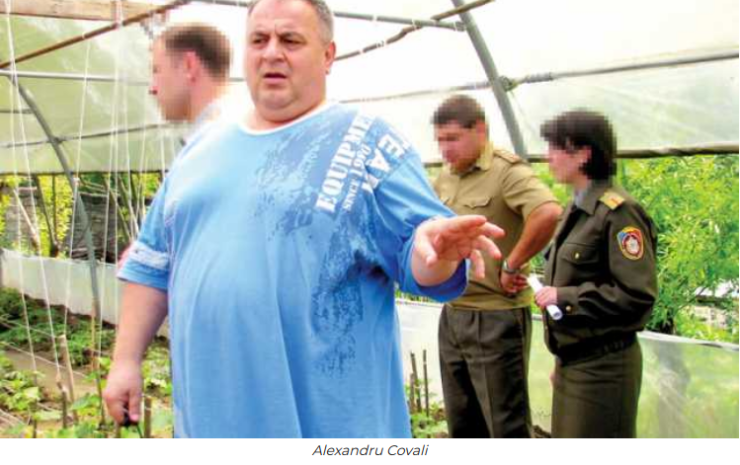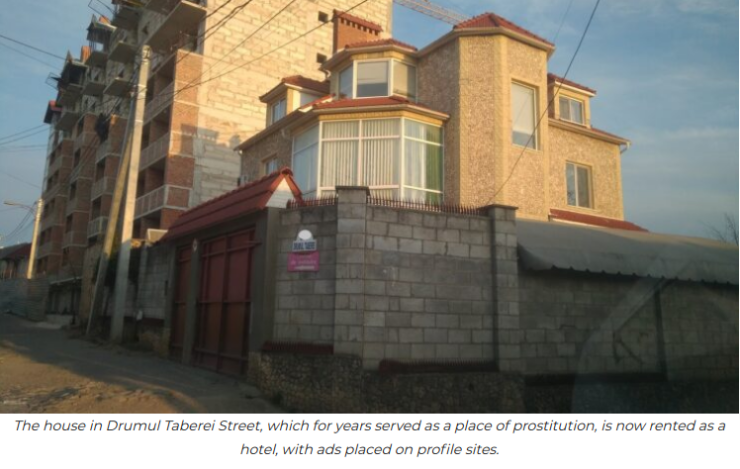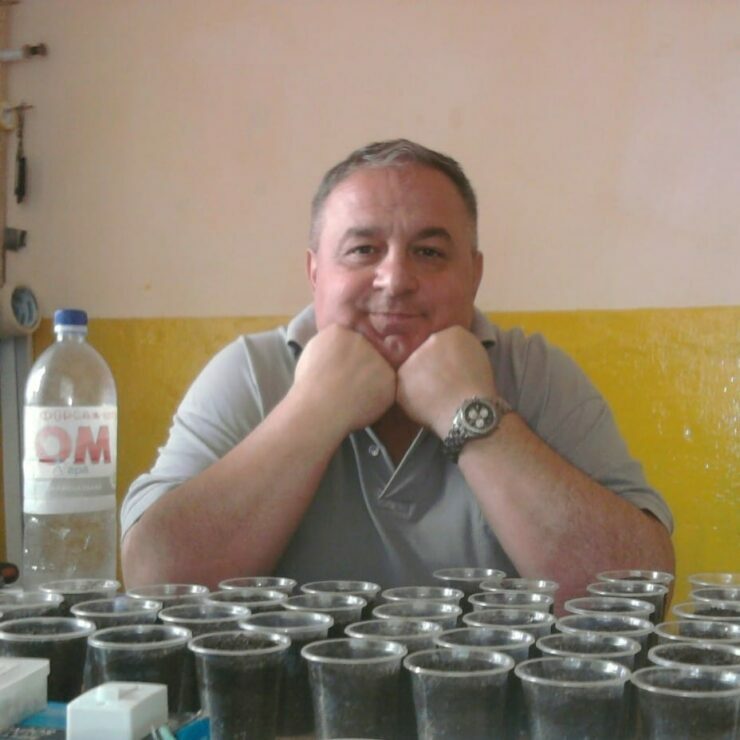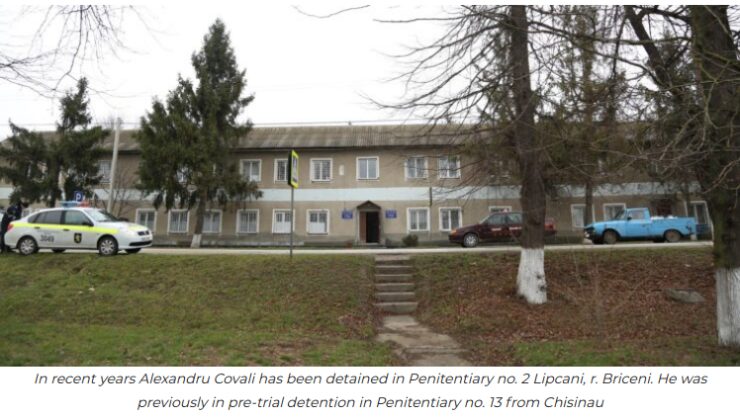Former Pimping Convict Shalun Released from Prison

Alexandru Covali, alias Șalun trafficked and forced numerous of girls into prostitution, many of them were underage. In 2006-2011, he created and led a network that exploited women both in Moldova and abroad. In 2006, Alexandru Covali, alias Șalun, was detained. Prosecutors asked for 28 years in prison, but the Chișinău Court of Appeal sentenced him only to 21 years.
The judges of the Supreme Court of Justice were even more lenient, and reduced his sentence to 19 years in prison. However, he served 13 years and seven months. On January 28, 2020, Alexandru Covali was released on parole. His sentence was reduced by more than five years, because of the bad conditions of detention in Penitentiary No. 13, as well as due to his exemplary behavior in Penitentiary No. 2 from Lipcani, where he was detained the last years.
Besides Șalun, other members of his group were released from prison ahead of time. Covali’s family told us that after he was released from prison Covali left the country.
In 2006-2011, Alexandru Covali was detained and prosecuted for several crimes, including child trafficking. According to a press release issued by the General Prosecutor’s Office, Alexandru Covali created a criminal organization operating on the territory of Moldova, Romania, and Ukraine, supervising a wide network of human trafficking, child trafficking and pimping, during the years 2001-2006.
According to prosecutors, the group recruited victims for sexual exploitation on the entire territory of Moldova, mainly in the regions on the left bank of the Nistru River. Subsequently, they transported the victims to Chișinău, and placed them in specially arranged houses and apartments.
How the Trafficking in Women “Business” Worked
According to the information in the case, the group led by Alexandru Covali recruited dozens of persons for the purpose of sexual exploitation. Following the arrest of Șalun, law enforcement officers identified victims among which at least 16 were minors, aged between 14 and 18. These, along with persons coming of age, were recruited in Ukraine, in the breakaway Transnistria region (Tiraspol, Dubăsari), as well as in various regions of Moldova – Chișinău, Bălți, Cahul, under the pretext of employment as dancers, waitresses or cooks in Chișinău or Turkey.
Mulțumim că citești ZdG!
Ajută-ne să continuăm să furnizăm informații esențiale — donează pentru jurnalismul nostru.

In Chișinău, they kept and forced the girls to offer sexual services in a house on Drumul Taberei Street, Buiucani sector. The house had a bar with a dance hall, a sauna, a swimming pool, as well as rooms for sexual relations, and living rooms for the exploited girls. Dozens of other girls were held in several apartments rented by Covali in the Buiucani sector or in the town of Durlești, a Chișinău suburb.
In addition to the house in Drumul Taberei, there was a sauna on Testemitanu Street, downtown Chișinău, as well as hotels, saunas or apartments located in different parts of the city, where girls were transported at customers’ request.
The case contains the names of about 20 people who helped Șalun run his “business”. The members of the criminal group had various roles. There was a dispatcher who received phone calls from those who wanted to have sex for money and coordinated the transportation of exploited persons, two drivers who took the girls to the required place and sometimes received money from customers, a night person in charge of the club on Drumul Taberei, who also supervised the girls there.
Trafficking in Women on the Chișinău – Timișoara Pathway
According to the same case, investigators identified more than 10 persons recruited in Moldova in the years 2001-2003, who were later transported to Timișoara, Romania, and placed in apartments rented by Tatiana Miron, one of the group’s members.
For example, in April 2002, P. E., 17, under the pretext of getting employment as waitress in Turkey, was recruited from Ungheni by two people who brought her to Chișinău and sent her to Alexandru Covali.
The Chronology of Șalun’s Conviction
In December 2006, Șalun’s criminal case reached the court and in 2011 the Supreme Court of Justice took the final decision in his case. On May 23, 2008, the Chișinau Court of Appeal found Covali guilty and convicted him on five parts of the claim: child trafficking (20 years in prison); trafficking in human beings (15 years in prison); pimping (five years in prison); the illegal carrying, storage, procurement, manufacture, repair or sale of weapons and ammunition (one year in prison) and the manufacture, possession, sale or use of official documents, printed matter, stamps or false seals (one year in prison).
Through partial accumulation of the applied sentences for concurrent infringements, Alexandru Covali was established a final sentence of 21 years of imprisonment, with the execution of the sentence in a high-security penitentiary. The prosecutor in the case had demanded a sentence of 28 years in prison.

By the same sentence of Chișinău Court of Appeal, other members of the group were convicted together with Șalun: Tatiana Miron, Irina Kaloșina, Victor Țurcan and Veaceslav Palade. Although the prosecutor had asked for a sentence of 21 years in prison for Șalun’s wife, Marina Covali, she was acquitted on the grounds that her deeds did not meet the elements of the offence.
The members of the Șalun group did not agree with the sentences and their case reached the Supreme Court of Justice. By the decision of November 27, 2008, the Court established new punishments: Alexandru Covali – 20 years in prison, Tatiana Miron – 20 years in prison, Marina Covali – four years in prison with the suspension of the sentence on a probationary period of three years.
On February 8, 2010, the Plenum of the Supreme Court of Justice issued a decision to admit the appeals for annulment declared by Alexandru Covali, Marina Covali and Tatiana Miron. They partially quashed the Court decision of November 27, 2008 ordering the repeated trial in the same court in order of appeal, with another panel of judges.
Thus, by the decision of the Criminal College of the Supreme Court of Justice of July 15, 2010, new, milder sentences were established: Alexandru Covali – 19 years in prison, Tatiana Miron – 18 years in prison, Marina Covali – four years with the suspension of the sentence on a probationary period of three years.

Photo posted on his Facebook account in December 2018, when he was still in detention
Șalun and his group did not accept the decision of the Supreme Court and repeatedly declared an appeal for annulment – an extraordinary appeal against the irrevocable court decisions. Thus, after a trial that lasted five years, on June 20, 2011, the Plenum of the Supreme Court of Justice put an end to the case of Alexandru Covali, who got a final sentence of 19 years in prison. Tatiana Miron got 18 years in prison, and Marina Covali got four years with suspension.
Șalun’s Son Admitted his Guilt, Sincerely Repented and Escaped Prison
Șalun’s son, Alexandru Covali played an important role in the group. Law enforcement officials established that in 2004-2006 (when he was 21-23 years old) he forced into prostitution and supervised several girls, in a sauna in Testemitanu Street, which, was inscribed as his property. He also supervised and transported the girls to places where they had to offer sex for money. In addition, according to a sentence of the Grigoriopol Court of June 4, 2010, as member of the group led by Șalun, he transported to Timișoara for sexual exploitation at least three girls.

According to the information in the case, Alexandru Covali jr. admitted his guilt and explained that he repented and asked the court not to punish him severely. Although he was found guilty of pimping, the Grigoriopol Court applied only a penalty in the form of a fine of around 400 euros (8,000 lei).
Asked about this case, Alexandru Covali, Șalun’s son, initially told us that “it was not true”, and after we gave him details of the sentence, he insisted to end the discussion and closed the phone.
Șalun’s Mother-in-law, Convicted of Pimping, but Left in Freedom
Although Șalun was in prison in 2006, his mother-in-law Aleftina Litvin, who is now 79 years old, together with another group of people, continued the sex “business”. This group has come under the scrutiny of law enforcement.
The data in the case show that a certain Svetlana Cernat was the organizer of the group. She directed the actions of the other members of the group, ensured the connection between clients and prostitutes, pressed certain people to practice prostitution and facilitated this activity, offering the house on Drumul Taberei Street, where hotel services were officially provided, organizing banquets and renting a sauna. Svetlana Cernat rented the building from Șalun’s mother-in-law, Aleftina Litvin, for 1,700 euros per month. Previously, the building also served as a place of prostitution. In June 2009, Litvin became the owner of the house. Previously, her daughter and son-in-law, Marina and Alexandru Covali, had owned the house.

In January 2019, the Supreme Court of Justice sentenced Svetlana Cernat to 11 years in prison with execution, while Covali’s mother-in-law, Aleftina Litvin, and a third person involved, Raisa Jimbei, received five years in prison with suspension of the sentence for a period of five years.
Șalun’s Repeated Attempts to Obtain Pardon
In addition to the appeals filed with the Supreme Court of Justice, Șalun tried to escape prison through a pardon from the president. In February 2013, Adevărul Moldova wrote that Șalun asked to be pardoned at least three times. The first two requests were taken by Victor Popa, former deputy, and by Mihai Moldovanu, former deputy prime minister, who then declared that he sent the letter to the President at the insistence of veterans, on the occasion of the 20th anniversary of the conflict on the Nistru River. Both requests for pardon were rejected.

In November 2012, a group of veterans who participated in the conflict on the Nistru River requested President Nicolae Timofti to pardon their “comrade” Alexandru Covali, although no one remembered seeing him on the battlefield in 1992. In an interview for Jurnal de Chișinău, Covali admitted that he did not participate in the conflict on the Nistru River. Timofti rejected the request for pardon, and Covali remained in prison.
Covali repeatedly applied for release on parole. On December 6, 2017, his lawyer filed a request for parole at the Edineț Court, Briceni headquarters, as soon as Șalun had served three quarters from the sentence, a basic conditions for release on parole. However, the court considered the conditional release of the convict inappropriate and premature, including the reason that he did not pay to one of the trafficked girls the non-pecuniary damages of 2,500 euros (50,000 lei).
Șalun and his lawyer didn’t agree with the refusal and appealed to the Bălți Court of Appeal. In May 2018, the court rejected their request for release on parole.
In December 2018, Covali repeatedly asked to be released on parole. However, on April 3, 2019, both the Edineț Court and Bălți Court of Appeal rejected his request because of the same non-pecuniary damage of 2,500 euros (50,000 lei), unpaid to one of the victims.
Released Five Years and Five Months Ahead of Term
Covali issued another request in which he complained that, during the period in which he was in Penitentiary No. 13 in Chișinău, he was detained in inhumane conditions and therefore must benefit from a reduction of the sentence. On January 28, 2020, the Edineț District Court, Briceni headquarters, admitted Covali’s complaint regarding the conditions of detention.
Judge Ghenadie Comerzan ordered the reduction of Covali’s sentence by 651 days (over a year and nine months) as compensation for the period in which Covali was detained in Penitentiary No. 13, including pre-trial detention.

Although the established sentence of 19 years in prison was to end on June 27, 2025, Covali was released from prison five years and five months earlier, on January 28, 2020. Following the reduction of 651 days due to poor detention conditions to which was added the reduction of 1,364 privileged working days, he thus served only 13 years and seven months.

The representatives of the Penitentiary No. 2 from Lipcani, where Covali was last detained, informed us that they appealed the court’s decision, considering that the calculation of the sentence reduction days was incorrect.
The court hearing had to take place at Bălți Court of Appeal on March 31, this year. However, due to the COVID-19 pandemic, they postponed the court hearing on this case, without setting the exact date of the next hearing.
Tatiana Miron, who was sentenced in the same case with Șalun to 18 years and six months in prison, was also released from prison ahead of term, following a decision of the Hâncești Court issued on October 16, 2019. The investigating judge, Valentina Suruceanu reduced the punishment by calculating “898 privileged compensated days” (two years, five months and 15 days) for unpaid and remunerated work in detention and established that Tatiana Miron actually served at least two-thirds from the term of punishment and may be released on parole.
We tried to contact Alexandru Covali through his family members. Both his son and his daughter told us that they do not communicate much with their father and that they cannot help us contact him, because he left Moldova.



